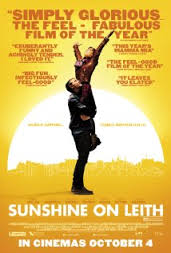
SUNSHINE ON LEITH
UK, 2013, 106 minutes, Colour.
Peter Mullan, Jane Horrocks, George Mac Kay, Kevin Guthrie.
Directed by Dexter Fletcher.
Do you know the group, The Proclaimers (since 1987)? If you do, and like their music, then you will be interested in seeing what has been done with their songs. As with Mamma Mia and the Abba songs, a fictitious story has been created, originally for the stage, and the songs inserted to highlight characters and their emotions, family crises and reconciliations.
If you do not know The Procalimers, you may have heard their popular song, I’m Gonna Be… 500 miles (which was used in Ken Loach’s The Angels Share). This gets the musical spectacle treatment as the finale. There album Sunshine on Leith is from 1988.
Response to this film will depend not only on the songs and their insertion into the plot, but also how characters suddenly beginning to sing in the middle of naturalistically filmed and realistic circumstances really works as cinema.
This reviewer did not respond really well to these devices in Mamma Mia, although the Abba songs are enjoyable in their way (and also part of our musical consciousness for decades). This time, apart from the climax, the songs were not so enjoyable, nor memorable, except that for a number of the songs consisted of repetitive, repetitive, lyrics, repeated frequently (to irritating effect). One of them, I’m getting over it, gets a repetitiously repetitive re-run during the final credits. Otherwise, the melodies were not engaging and some of the lyrics, especially in a song about Florida looking towards Canada are less than inspired or inspiring.
The setting is Scotland – and Edinburgh looks wonderful. Two soldiers return from service in Afghanistan, to a rather dreary civilian life, to some romance (with some heartbreaks) and a crisis that has nothing to do with them but with the parents of one of them (Peter Mullan and Jane Horrocks) and a marriage crisis.
Without the songs, this would be conventional enough. And, with the songs, it still remains conventional enough. But, that climax of 500 Miles with exuberant crowds and cast outside the National Gallery in Edinburgh has great vitality.
Probably best to check with someone who really liked it.
1. The Proclaimers and their songs, incorporated into a fictitious play, opened out for the screen?
2. Edinburgh, looking good and attractive, homes, workplaces, the hospital, pubs, the streets? The landmarks?
3. The songs, the melodies, the lyrics? Inserted into the action of the story? How credibly?
4. The opening in Afghanistan, sense of realism, the truck, the men, their singing, the threat of death at any time? The explosion?
5. The narrative, the sense of realism, naturalism? The contrast with the songs and their artificiality in this naturalistic setting? The insertion? How will did
they work? The characters, situations, emotions, tensions?
6. The basic plot, the men in war, the women at home, parents? The drama with the information about the unknown daughter, with Lizzie’s refusal of Ally’s proposal, David and Yvonne with their choices? How well would the film work as drama without the songs?
7. The songs, their impact within the context of the drama, revealing character, difficulties, crises, emotions?
8. Ally and Davey, coming home, their song in the Edinburgh Street – ah-ha? Going to their families, the joy of the men coming home, experiences of love?
9. Jobs contact, call centres? Hospitals? The pub and the songs? The young men and women gathering together, support, revelation of characters? The women and their work at the hospital?
10. Jean, working at the gallery, her girlfriends, Harry and his interventions? Confiding in the girls, the song and dance with Harry and the women?
11. Davey and his place in the family, with his parents, his sister? Meeting Yvonne at the pub? Going out together, moving in, happy, Yvonne’s challenge about him going to England with her, his answers and her being upset, leaving? His going to the hospital to find her, hurrying to the railway station, his mother’s advice about making the relationship work?
12. Rab, the father of the family, a good man, with Jean? Welcoming his son home? Receiving the unexpected letter, the news of his daughter, going to the funeral, the mass, talking with her, not going to the funeral itself? The 25 years? The celebration, everybody at the gathering, singing and dancing? Telling Jean, her reaction, justified? Her being upset, at home, his sleeping on the couch? His doing the shopping, his collapse? Jean and the advice of Harry and her friends? Her feeling hurt, talking about the issue, find the photo of Rab and the daughter’s mother? His collapse, going to the hospital, holding his hand, singing? His gripping her hand? His coming out of hospital, asking about the daughter, his saying that he would have to see her, Jean having asked her to be the driver? Reconciliation?
13. Ally, the preparation for his proposal, in the pub and the singing advice of the barman of how to propose? The solemn proposal, his speech, Lizzie and her refusal? Ally’s anger, the saying that he was her best pal, his being morose?
14. Ronnie, in rehabilitation, Davey going to see him, Ally not?
15. Ally, going to see Ronnie? Arguing with Davey, not wanting his help, enlisting? Seeing him singing on location in Afghanistan?
16. Lizzie, wanting to make choices, the world before her, the application for the nursing job in Florida, her choices? Her mother giving sensible advice?
Seeing her in Florida?
17. The big finale, moving into movie musical style, the crowds, the square outside the National Gallery, everybody singing 500 miles?